| Article ID | Journal | Published Year | Pages | File Type |
|---|---|---|---|---|
| 8427869 | Theriogenology | 2018 | 20 Pages |
Abstract
This study used infrared thermography to monitor the immediate inflammatory reaction to an intratesticular injection of 20% (calcium chloride) CaCl2 with 0.5% dimethyl sulfoxide (DMSO) for chemical castration and to provide evidence of the treatment's clinical viability. Six animals received a 0.25Â mL intratesticular injection of 20% CaCl2 with 0.5% DMSO in each testis. Thermographic imaging, testicular measurement, penile spine evaluation, electroejaculation, and sperm analysis were performed before the injection. Eighty days post-injection, the cats were evaluated again, then received an orchiectomy followed by histological analysis. Infrared thermography of the testicular area was performed before (M0) and after anesthesia (M0A); after electroejaculation (M0E); 10Â min (M1), 1Â h, (M2) and 6Â h (M3) after the injection for seven consecutive days (M4-10); after 15 (M11) and 30 days (M12); and after 80 days, before and after anesthesia and after electroejaculation (M13, M13A and M13E). No cats had a significant increase in testicular temperature or behavioral changes. All animals were azoospermic and had a 50% reduction in total testicular volume after 80 days. Histologically, the testes showed different degrees of degeneration, necrosis, calcification and replaced connective tissue, as well as Leydig cell hyperplasia in 7/12 of the testes. Infrared thermography efficiently diagnosed and monitored scrotal inflammation caused by intratesticular injection of 20% CaCl2 solution with 0.5% DMSO, and it is suggested that a single injection of this compound can cause azoospermia after 80 days. We concluded by infrared thermography with a clinical exam, that the adverse reactions were minimal and did not interfere with animal welfare.
Keywords
Related Topics
Life Sciences
Agricultural and Biological Sciences
Animal Science and Zoology
Authors
Cristiane Sella Paranzini, Anne Kemmer Sousa, Guilherme Schiess Cardoso, Felipe Montanheiro Perencin, Luiz Guilherme Corsi Trautwein, Ana Paula Frederico Rodrigues Loureiro Bracarense, Maria Isabel Mello Martins,
